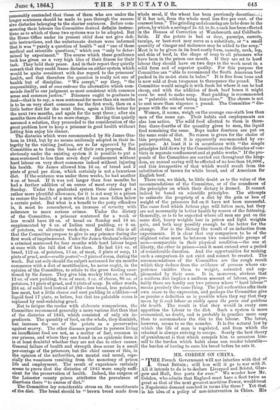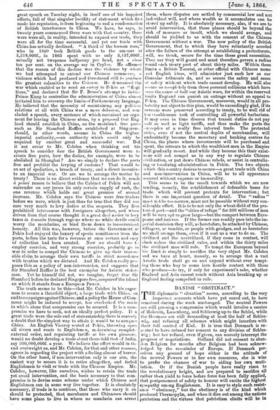MR. COBDEN ON CHINA.
" RE French Government will not interfere with that of Great Britain ; still less will it go to war with it. All it intends to do is to declare Liverpool and Bristol, Glas- gow and Hull, free ports for ever." We wonder how Mr. Cobden, who admits that England must have a fleet twice as great as that of the next greatest maritime Power, would treat a Napoleonic demand couched in terms like those ? Yet that is his idea of a policy of non-intervention in China. His great speech on Tuesday night, in itself one of his happiest efforts, full of that singular lucidity of statement which first made his reputation, is from beginning to end a condemnation of British interference in China. We have, he says, in twenty years commenced three wars with that country, those wars were all, in reality, intended to expand our trade, they were all for the time successful, and yet our trade with China has actually declined. "A third of the human race," who in 1860 took British goods to the amount of 5,318,000/., in 1863 spent with us only 3,137,000/., actually not twopence halfpenny per head, not a clear tea per cent. on the average say in Ceylon. He affirmed that the reason of this decline was the violence by which we had attempted to extend our Chinese commerce, a violence which had produced and threatened still to produce the greatest calamities to the Chinese. He denounced the war which enabled us to send an envoy to Pekin as " flagi tious," and declared that Sir F. Bruce's attempt to intim, Prince Rung to centralize the administration of China almost irritated him to overstep the limits of Parliamentary language. He believed that the necessity of maintaining any polifiem relations at all with China was a mere delusion, and con- cluded a speech, every sentence of which contained an argu- ment for leaving the Chinese alone, by a proposal that Eng- land should establish in China, on the mainland, free porr,. such as Sir Stamford Raffles established at Singapore, should, in other words, assume in China the higlies. imperial authority,—an authority which could only be acquired by another great and successful war. Did it not occur to Mr. Cobden when thinking out his speech to consider how the British Government were to create free ports, how the duties, for example, were to he abolished in Shanghai ? Are we simply to declare the ports free and prohibit the levying of customs ? That would he an act of spoliation, a breach of treaty, and a direct incentive to an imperial war. Or are we to arrange the matter by treaty ? There is no direct evidence that we can do it, much a priori reason to believe that the Cabinet of Pekin will not
surrender on any terms its only certain supply of cash, the one revenue which holds out- great promise of annual increase. Mr. Cobden says the Chinese were free-traders before we were, which is just thus far true that they did not care very much to levy duties at the seaports. They first prohibited intercourse with foreigners altogether, and when
driven from that course thought it a great deal easier to levy taxes in transitu through regions where no white devils could worry the mandarins, or bind them down to inconvenient honesty. All this was, however, before the Government ol
Pekin had enjoyed the luxury of specie remittances from the ports, before the taste for a revenue at once certain and easy of collection had been created. Now we should have ts employ coercion, and very strong coercion, probably go to war in order to compel the Chinese to give up their reason- able claim to arrange their own tariffs in strict accordance
with treaties which we dictated. And Mr. Cobden really pro- poses this as a policy of non-intervention, and suggests that Sir Stamford Raffles is the best exemplar for Asiatic states- men. Yet he himself did not, we imagine, forget that Sir Stamford before he declared Singapore free, conquered the island on which it stands from a European Power.
The truth seems to be this—that Mr. Cobden in his eager- ness to secure a threefold object, a large trade with China, an end to campaigns against Chinese, and a policy the House of Com- mons might be induced to accept, has overlooked the mode in which alone that compromise can be secured. It is a com- promise we have to seek, not an ideally perfect policy. It a great trade were the sole end of statesmanship there is scarcely a doubt that the simplest way to attain it would be to conquer China. An English Viceroy seated at Pekin, throwing open all rivers and roads to Englishmen, maintaining complete external order, and regulating tariffs at his own pleasure, would no doubt develop a trade about three-fold that of India, say 300,000,000/. a year. We believe the effort would in the end overweight us, and Mr. Cobden, for that and other reasons, agrees in regarding the project with a feeling almost of horror. On the other hand, if non-intervention only is our aim, the easiest way to secure it is to retire altogether, and forbid Englishmen to visit or trade with the Chinese Empire. Mr. Cobden, however, like ourselves, wishes to retain the trade yet avoid intervention, and the basis necessary to that com- promise is to devise some scheme under which Chinese and Englishmen can in some way live together. It is absolutely necessary, if trade is to continue, that those who carry it on should be protected, that merchants and Chinamen should have some place to live in where no mandarin can arrest
them, where disputes are settled by commercial law and not individual will, and where wealth as it accumulates can be stored up safely. It is absolutely necessary, also, if we are to avoid intervention, that these places should be beyond the risk of massacre or insult, which we should avenge, and should be yielded to us with the consent of the Chinese Government without a war. The new policy of the British Government, that to which they have reluctantly acceded after the failure of the attempt at establishing a protectorate, will, we think, secure for the time these great necessities. They say they will guard and must therefore govern a radius round each treaty port of about thirty miles. Within these limits a British Taoutai or other official with Chinese name and English ideas, will administer just such law as our Consular tribunals do, and so secure the safety and sense or safety witheut which trade cannot develop. He will also secure us completely from those personal collisions which have neen the cause et half GUT Asiatic wars, for within the reserved limits England can punish an outrage without an appeal to Pekin. The Chinese Government, moreover, would in all pro- bability not object to this plan, would be exceedingly glad, if its revenue were preserved according to treaty, to be well rid of tne troublesome task of controlling all powerful barbarians. It may even in time discern that transit duties do not pay mill so well as light tariffs, and thus make the ports the ere repels of a really free internal trade. The protected cities, even if not the central depOts of merchandise, will undoubtedly become the monetary and banking centres for China, the places where investments will be purchased and spent, the retreats to which the wealthiest men in the Empire will gradually resort. And while they become this their exist- ence will not compel us in any way to regulate Chinese sivilization, or put down Chinese rebels, or assist in centraliz- ing or localizing administration in Pekin. The two objects which this country desires to secure—a great trade with China and non-intervention in China, will be to all appearance secured without expense or immorality.
This seems to be the result towards which we are now tending, namely, the establishment of defensible bases for trade, which will prevent pretexts for intervention ; but there is one important question of detail. The " radius " must not be too narrow, must not be passable without very con- siderable effort. It is to be not only the wheat-field of the pro- tected port—and the "cities of refuge" for 300 millions of men will be very apt to grow large—but the rampart between Euro- peans and natives. If the former can readily pass into the im- perial domin ion they will, as heretofore, be attacked by Chinese, villagers, or bandits, or people with grudges, and as heretofore we shall avenge them, even if it cost us a war to do so. The civilized and the uncivilized, if they come in contact, will clash unless the civilized rules, and within the thirty miles the civilized man will rule. To tempt the European beyond his limit is simply to sacrifice the very object Mr. Cobden and we have at heart, namely, so to arrange that .a vast Asiatic trade shall go on and expand without ever tempt- ing those who buy to come into hostile contact with those who produce—to try, if only for experiment's sake, whether England and Asia cannot touch without Asia breaking up or England feeling compelled to rule.































 Previous page
Previous page